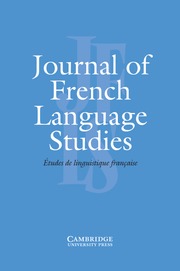No CrossRef data available.
Article contents
Linguistic convergence/divergence or degree of bilingualism?
Published online by Cambridge University Press: 12 April 2016
Extract
In their article, Mougeon, Hallion, Bigot, and Papen attempt to explain the similarities and differences among four varieties of Canadian French spoken outside Quebec (and New Brunswick) in the use of the restriction forms rien que, juste, seulement (que), and ne . . . que. Mougeon and colleagues focused on the French varieties spoken in Welland (Ontario), Saint-Boniface (Manitoba), Saint-Laurent (i.e., Mitchif French, Manitoba) and Bonnyville (Alberta) (see also Nadasdi & Keppie 2004). Using a variationist sociolinguistic framework, they examined the effect of linguistic and extralinguistic factors on speakers’ use of the aforementioned restriction forms, and compared their results to those reported in previous studies of the French varieties spoken in Montreal (Quebec) (Massicotte 1984, 1986; Thibault & Daveluy 1989) and in Hawkesbury, Cornwall, Northbay, and Pembroke (Ontario) (Rehner & Mougeon 1998). Based on their results, Mougeon and colleagues made hypotheses regarding linguistic convergence/divergence and raise relevant questions for future research. In this commentary, I briefly assess some of the contributions made by this research from a psycholinguistic perspective. In doing so, I raise additional questions concerning the source of the effects reported in the study.
- Type
- Commentary
- Information
- Copyright
- Copyright © Cambridge University Press 2016





